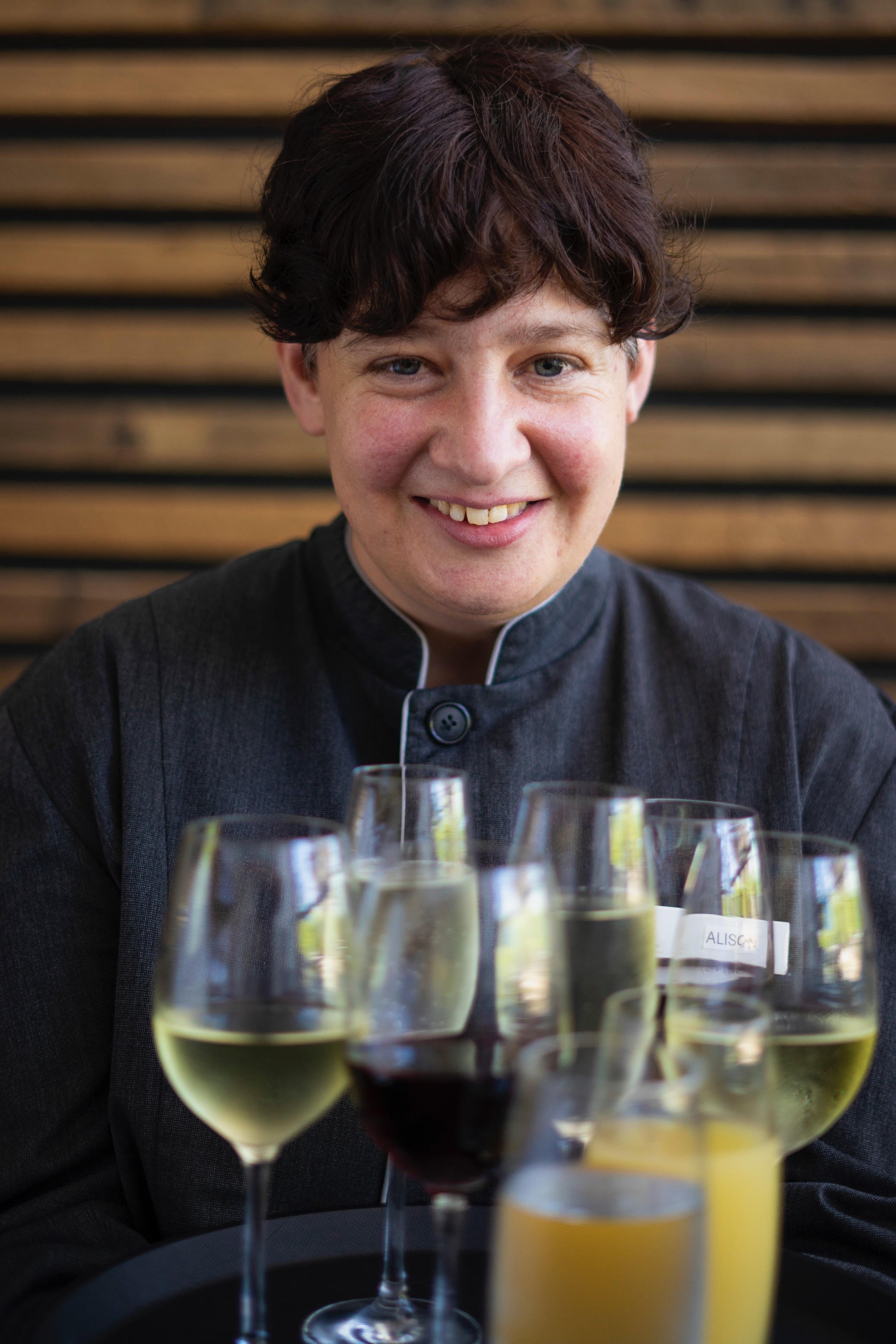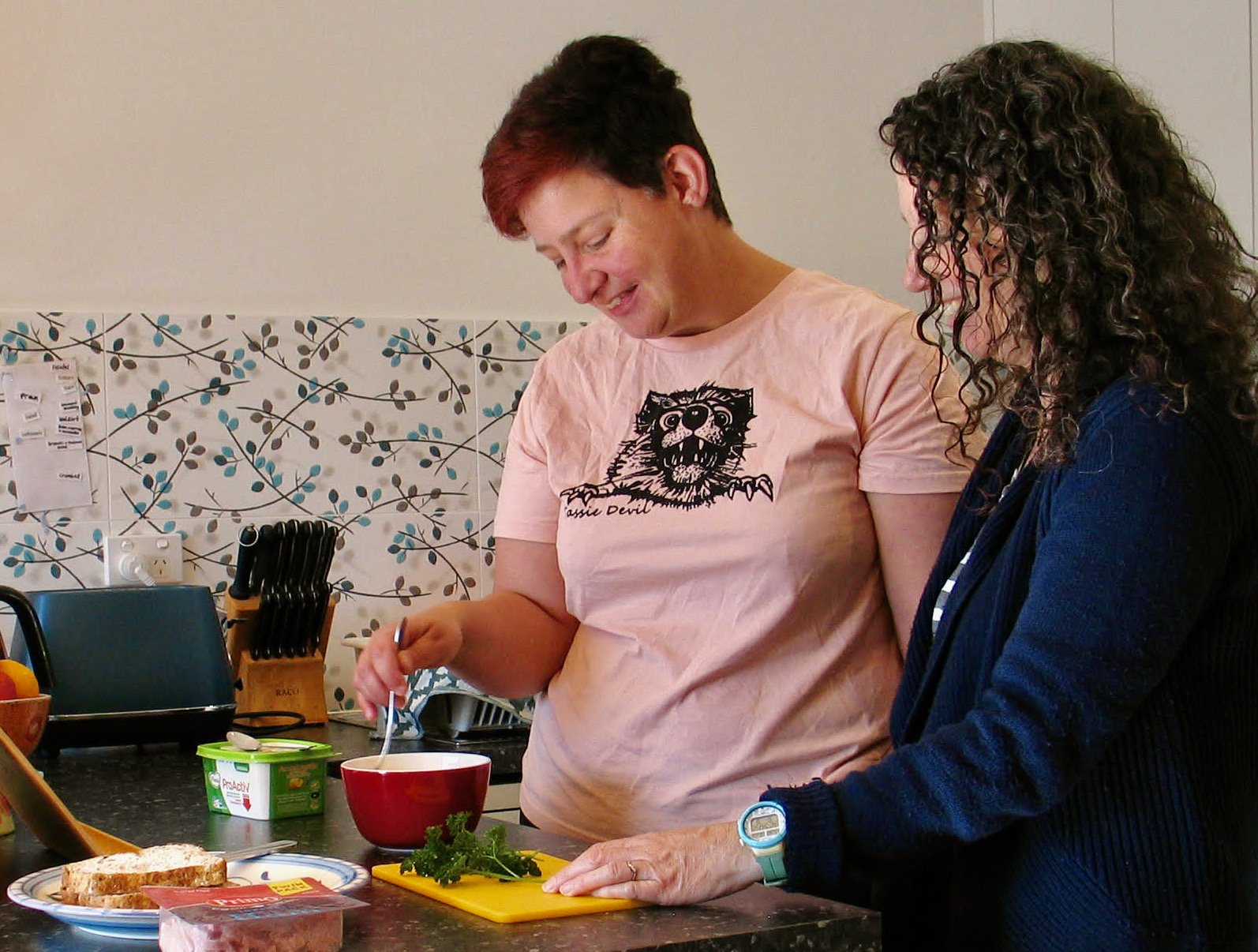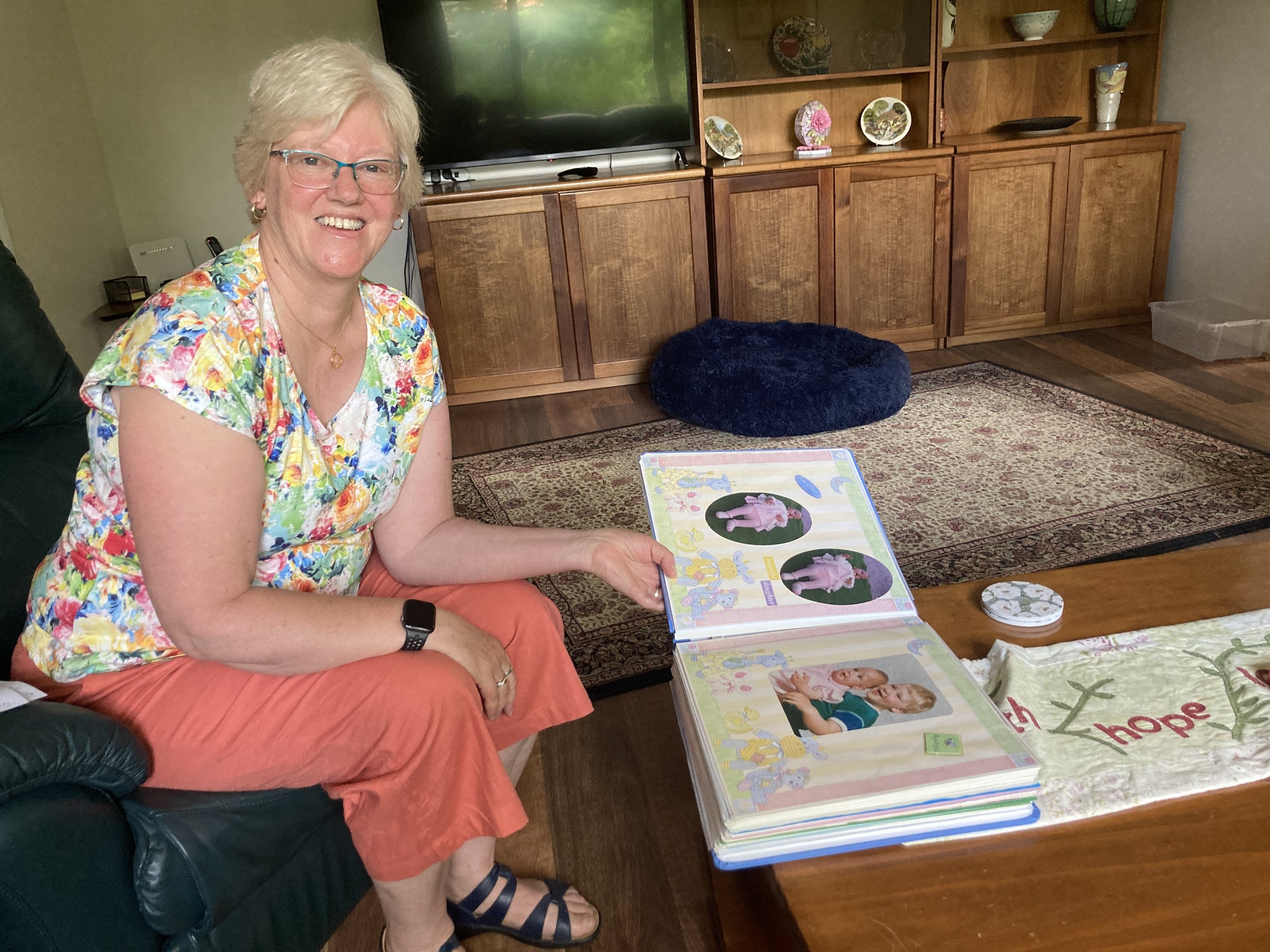The Beauty of Being Able to Look Back
An interview with Sue Barrow
This article is part of a series of interviews with families experiencing disability and their faith.
I first heard about Sue from a mutual friend. He’d known her for a long time and seen the remarkable work of her and her husband as they helped their daughter, Alison, transition from infancy to adulthood, all whilst rallying the churches that they were a part of, around their daughter. They even started a ministry for people with disabilities (but that’s a story for another time). I was intrigued and eventually found myself delving deep into their story with Sue, as we chatted over a cuppa in her living room in Canberra. As you might imagine there are a lot of life lessons worth sharing in a network of parents navigating similar journeys. I hope to write another article in future focusing more on Alison and the gifts God has clearly given her in building others up. But here’s where we’ll start.
Alison is the second-born child and the only girl, of John and Sue. In the postnatal ward, as Sue cradled newborn Alison in her arms, she noticed a baby with Down Syndrome in the room. In that moment, Sue was yet to realise she also held a baby that would need extra support in life. Alison showed no visible signs of having a disability but eventually Sue noticed that Alison was a “floppy baby.” She also struggled with reflux and didn’t seem to be reaching her expected milestones.
Alison was eventually diagnosed with an intellectual disability and much later in life, with autism spectrum disorder. With the initial diagnosis came a myriad of early intervention appointments. Sue was advised to join a playgroup with kids with similar needs and threw herself into all that she was advised to do. “I didn’t handle it very well, the whole process of being in early intervention and keeping up with the therapies” she reflects. At that time, she’d assumed all of this would fix Alison “but it wasn't going to be a fix” she would come to realise.
Sue and John went through a lot of grief at that time. Sue’s own parents didn't acknowledge the concerns about Alison's development so weren’t particularly supportive. Still, Sue says, “they loved her.” Sue also grieved seeing her daughter unable “to keep up with her peers” and missing out on invitations to various things. John and Sue found that Alison did find the acceptance and support they longed for her from their church. The other “parts of the body” (members of the church) served Alison during the early intervention phase. They came over to help her engage in her physiotherapy and occupational therapy programs. It was Christ’s love in action.
When it came time to think about school, Sue knew from her own experience as a teacher-librarian that Alison could attend a mainstream school. Both Alison and her parents hoped she could attend the same school as her brothers but their school had never had a child with a disability before. In the end, the local primary school’s partly integrated special needs class was the best fit.
When her high school years were approaching Sue and John requested again for Alison to be enrolled where her brothers were going, a K-10 school. By the time Alison was in year six the school was still telling them “not yet, we haven’t got the resources.” Sue was more than ready for this challenge. By now she had qualifications in special education. Her persistence in advocating for Alison led the school to form a committee to start the process of accepting her as a student, with the support of the principal. Sue and another friend trained in special education formed part of the committee, among others. They even engaged a professor in special education from the university to contribute.
“We really did a lot of work,” says Sue, looking back. The committee steadily worked with staff and senior students to build their awareness of disability. As a result, Alison attended the school as the first student to be enrolled with a disability. Once more, the body of believers supported Alison, with people from church coming into the school to volunteer as teachers’ aides. A special education teacher was also employed in Alison’s first year and the intake of kids with disabilities grew year after year.
Sue and John’s dedication to their daughter didn’t end there. Sue anticipated that what Alison most needed to take away from her high school years wasn’t a year 10 or 12 certificate but to be ready for work. This was during a time before vocational education and school-based apprenticeships existed. Sue and John took the initiative themselves in building work experience into Alison’s school life, approaching businesses in the area to ask for placements for her. From year 7, Alison spent half a day per week in a work setting that she had an interest in, such as a childcare setting and a pet shop. The hope was that she’d end up with a good reference at least, if not a job by the end of school. Alison also did some vocational training at the Canberra Institute of Technology during her school years.
Alison at the convention centre where she has worked for 10 years
As they’d hoped, Alison did find a job after school. She was employed by a well-known fast food restaurant for 7 years, more than many of us have worked in any one job! Alison caught two buses to and from the restaurant and worked a few hours a day, 5 days a week. After this a few more jobs followed, at a childcare centre and costume shop but eventually Alison found a job with an event venue. The manager at the time was well informed about disability inclusion in the workplace and invited Alison into the team. She insisted on paying her the standard wage that other staff had. Alison still works for the business today, setting up for functions, clearing the tables and cleaning. Alison is not just an employee but a valued member of her workplace. Her workmates, old and new, come up to say hi when they see her out and about in Canberra. Sue can tell from how they relate to her that she’s well-liked and respected. Since Alison started working, other people with disabilities have been employed at her workplace as well. Recently Alison was recognised for 10 years of service at her workplace, at a formal ceremony.
Alison holding her 10 year service award
Alison is not just a faithful employee but a faithful Christian. Sue shares a verse with me from the bible that resonates with how she sees Alison’s faith. In Mark 8:36 (NIV) Jesus says “what good is it for someone to gain the whole world, yet forfeit their soul?” Sue expands, “it doesn’t matter what your intellect or abilities or achievements are, what matters is if you are a Christ follower.” A child-like faith such as Alison’s is what Jesus pointed to as an example for all of us to live by. It’s to those like Alison that he reveals himself:
I praise you, Father, Lord of heaven and earth, because you have hidden these things from the wise and learned, and revealed them to little children. Yes, Father, for this is what you were pleased to do (Luke 10:21, NIV).
While child-like might describe her faith, it does not describe Alison’s level of independence, which Sue also really values about her daughter. You see, Alison lives out of home on her own. Sue and John wanted Alison to live in a context where her Christian values were reflected. They weren’t confident that a group home could offer this. With the help of a financial planner and circumstances that were in Sue’s words, “nothing short of a miracle,” they eventually secured a loan to buy a property for Alison. Not long after, Sue happened to glance at a flyer advertising a townhouse for sale on the church notice board. It was a great fit for Alison. A short bus ride to her parents’ place and her work. In God’s perfect timing, a lady that Alison knew needed accommodation for a season, and moved in even before Alison did, becoming her housemate. John and Sue helped to slowly transition Alison into the townhouse - starting with one night, then two, then three and then Alison finally moved into her very own place.
After a year, Alison’s first housemate moved out to buy her own place. A few more housemates followed, but things didn’t turn out quite as smoothly. Sue bravely asked Alison when the final housemate had left “are you better off by yourself?” “Yes” she replied.
Alison with one of her support workers who also shares the same faith.
When Alison started receiving daily living support from the NDIS it was a "game changer” Sue says. It meant that she could function for lengths of time without Sue’s help. Sue could even go a whole day without thinking about Alison’s welfare. While it must have felt unfamiliar and even alarming at first, Sue tells me casually “some days we don’t hear from her.” Alison receives help a few hours a day to prepare meals and attend to household tasks. At the beginning of the week, she shops with a support worker and plans out her schedule for the week. “Does Alison get anxious?” I wondered aloud. “Only when a support worker cancels and there’s a change of routine,” Sue says. Alison is also supported informally by ladies from church who pick her up for church and Bible study and take her out for outings.
Sue shares with joy that Alison’s paid carers go above and beyond their roles. A couple of them have a deep faith in Christ and walk alongside Alison through her ups and downs, helping her to read the Bible, write cards to people and journal her prayers. It’s clear that Alison is in the hands of her Heavenly Father, who clearly knows her needs and provides for her.
If you’re a parent of a child with a disability you might have a pit in your stomach thinking about your child living out of home one day. There are risks that Sue and John have had to confront and accept in this process. Though Alison initially had access to the internet it became clear that she was at risk of being taken advantage of by others. Alison had sought out social connection online and Sue sensed this was because she’d been feeling isolated. Sue shared about Alison’s needs with their minister and he encouraged a few people to consider reaching out to her. “And it worked,” Sue tells me. Some women from church are now in regular contact with Alison and organise to take her out to lunch. Alison is content to leave her time spent online till she’s at her parents’ place. Sue and John have an app called ‘Qustodio’ which shows them the communication that she’s engaged in with others, limits her time on wifi and what she can view on the internet.
Sue and John have thought quite a bit about what might happen when they can’t support Alison in their old age or when they pass away. “One of our sons and his partner will take responsibility for her, and I’m hoping the church will too,” Sue shares.
I ask Sue what she’s learned about God through her journey as Alison’s mum. “I’ve learned that he’s faithful. He’s always surrounded us with people who can help, you know. We’ve got these really strong friendship structures and people who would support us through thick and thin. And He gave us a means to buy [her a] place.”
She shares some words from the Bible that have meant a lot to her:
And we know that God causes everything to work together for the good of those who love God and are called according to his purpose for them (Romans 8:28, NIV).
Sue looking at a photo album
Why does this resonate with her and John? She reflects deeply, “when we look back at Alison's life and who she was as a little person and who she is now, and how she's grown, you can see how God has worked all things together for good. And I suppose that's the beauty of being able to look back. To look back on God's faithfulness and know that he's going to be faithful in the future. And that nothing can separate us from the love of God.”
I ask Sue if there’s something she’d like to share with other parents raising children with a disability. She says with enthusiasm “the only person who can advocate for your child is you (...). You've got to say what you want. And if you want your child to be included you've got to push for it yourself. You've got to be a pushy mother, nice, but pushy.”
Fiona Jongsma
This article was first published in The 139 Collective





